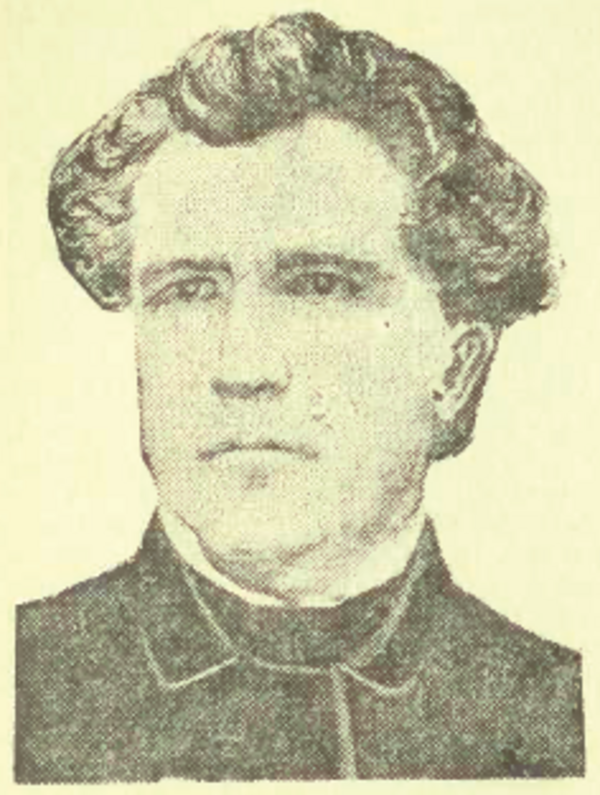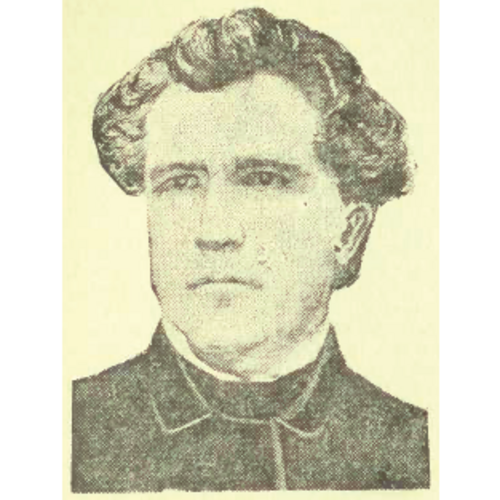
Source: Courtesy of Wikimedia Commons
BOWES, JOHN GEORGE, merchant, entrepreneur, and politician; b. c. 1812 near Clones, County Monaghan (Republic of Ireland); m. Ann Hall, and they had nine children; d. 20 May 1864 at Toronto, Canada West.
John George Bowes came to Upper Canada from Ireland in 1833 and was employed by his brother-in-law Samuel E. Taylor, a York (Toronto) merchant. When Taylor died in 1838 Bowes wound up the business, served as manager for the Messrs Benjamin who occupied Taylor’s business premises, and then with another brother-in-law, John Hall, opened a successful wholesale dry goods business. By 1840 they were able to buy the Toronto business of Buchanan, Harris, and Company when the latter transferred its operations to Hamilton.
Bowes soon acquired a reputation as an astute businessman, and his genial personality made him popular among Torontonians. It was said that few had warmer personal friends. Of medium height and well built, he was a handsome man who enjoyed vigorous exercise. His contemporaries circulated many anecdotes concerning his physical prowess, and affectionately called him “an ugly customer in a row.”
During his lifetime Bowes held numerous important and responsible offices: he was president of the Toronto and Guelph Railway Company, an incorporator in 1852 of the Grand Trunk Railway, president of the St Patrick’s Society, and president of a savings society, in addition to serving on the boards of directors of numerous commercial and financial enterprises. He had a reputation for personal generosity to both charitable institutions and needy individuals. Though a Conservative in politics, his principles and views were generally liberal. With Adam Wilson* he was credited with successfully urging the establishment of scholarships to permit exceptional common school graduates to attend the Toronto Grammar School.
As his prosperity and popularity increased, Bowes sought public office. In 1847 he was appointed a common school trustee by city council and three years later was elected an alderman for St James’ Ward. He was chosen mayor of Toronto by the city council in 1851, 1852, and 1853. Both as a Toronto merchant and as mayor, Bowes was anxious to promote the city’s metropolitan aspirations. But his eye for profitable investment and his interest in the expansion of Toronto’s commerce led to his involvement, with Francis Hincks*, in a celebrated conflict of interest scandal in 1853 – “the £10,000 job.”
To encourage the building of the Ontario, Simcoe, and Huron Union (later called the Northern) Railway from Toronto to Collingwood, the city of Toronto invested £50,000 in the railway’s stock, payable in city debentures bearing interest at 6 per cent. The railway, in turn, agreed to use the debentures as payment to the contractors building the road. Anxious to obtain working capital, the contractors endeavoured to sell them on the open market. But the bylaw under which they were issued had been defective, chiefly because it failed to establish a provincially required sinking fund to retire the debentures. The issue was further complicated because current interest rates had risen to 7 per cent, and the best offer the contractors received was for 75 per cent of the debentures’ face value. At this point Bowes approached Hincks, who was both premier and inspector general of finance, and proposed that they purchase the bonds jointly at a discount of 20 per cent. This purchase was not known to the city council. Bowes was at this time arranging for the council to petition for a provincial act authorizing the city to refinance its debt and issue new debentures redeemable at par in ten years. Hincks and Bowes were then able to exchange their depreciated bonds for new ones which they soon sold in England, through Hincks’ financial connections, at a discount of 2 per cent, giving a profit on the whole transaction of £8,237.
When these events became public a great uproar ensued. Hincks and Bowes were accused by their political opponents and the opposition press of corruptly manipulating the price of the debentures for their personal advantage. Committees of investigation were set up by the provincial legislature and the city council. Their reports absolved the two partners of having acted dishonestly; the city council, in particular, while deeply regretting Bowes’ want of candour, held that his services to the city should exempt him from further censure. Cries of “whitewash” arose and five aldermen and three councilmen resigned in protest. In the next municipal elections all eight were successful, while only two of the 13 who had supported Bowes were re-elected. The city sued Bowes for his share of the profit on the transaction. The Court of Chancery did not find Bowes guilty of fraud, but held that since he was acting as the city’s trustee he must pay over his profits to it. Bowes withdrew briefly from public life.
He soon regained his popularity, and in 1854 was elected one of Toronto’s representatives in the assembly. Though he was a Wesleyan Methodist, Bowes opposed secularization of the clergy reserves, and he supported expansion of the separate school system in Canada West, arguing that schools established for Protestants in Canada East should be matched by facilities for Catholics in Canada West. He thereby earned the bitter enmity of George Brown and the Toronto Globe. Bowes also promoted the interests of Toronto in the assembly by introducing or supporting bills for the settlement of the city’s northern boundary, for the erection of waterworks, and for encouraging waterfront development. He served the mercantile community by advocating an improved bankruptcy law and by introducing bills to incorporate the British Bank of Canada and to amend the charter of the Colonial Bank of Canada.
In 1856 he re-entered municipal politics and was elected an alderman for St David’s Ward, and in 1861 was again elected mayor – this time by the electorate at large. Bowes spent lavishly on his election campaigns, and established a political power base among the Irish population of Toronto which enabled him to win re-election as mayor in 1862 and 1863. While Bowes was mayor the city bought its first fire engine and opened a privately owned street railway, becoming one of the first cities in North America to acquire this “symbol of progress and pride.” Licensed by council in March 1861, the railway had six miles of track and was carrying 2,000 passengers daily in December. Bowes at one time held a controlling interest in the railway. In January 1864, when the separate school controversy was at its height, he sought a seventh term as mayor. He was defeated by the provincial grand master of the Orange lodge, Francis Henry Medcalf*, who was vigorously supported by the Globe.
When he died in 1864 Bowes left a widow and nine children. His funeral was attended by all classes of the city. The Globe remarked that “as a business man he had few equals in the community,” and that although “shrewd, observant and calculating,” he was “to all a kind, generous man.” His fellow councillor, Samuel Thompson*, believed him “far the ablest man who had ever filled the civic chair.”
PAC, MG 24, D16; MG 29, E29, 23. PAO, Mackenzie-Lindsey papers; Toronto City Council papers, 1850–54, 1856–64. Journal of Education for U. C., XVII (1864), 77. Hincks, Reminiscences, 355–58. Globe, 1851–64. Leader, 1851–64. Montreal Gazette, 1853–54. Toronto, City Council, Report of the debate in the city council . . . in reference to the £50,000 city debentures . . . (Toronto, 1853); The report of the debate in the city council on . . . the report of the special committee appointed to investigate in reference to the issuing of city debentures . . . (Toronto, 1853); Report of the select committee appointed to inquire into the issue and sale of city debentures (Toronto, 1853). The Canadian men and women of the time: a hand-book of Canadian biography of living characters, ed. H. J. Morgan (2nd ed., Toronto, 1912). Careless, Brown. Creighton, Macdonald, young politician. Davin, Irishman in Can., 279–82. P. G. Goheen, Victorian Toronto, 1850 to 1900: pattern and process of growth (Chicago, 1970). Middleton, Municipality of Toronto, I. “Mayors of Toronto,” Toronto Calling, the Monthly Magazine of Toronto Life, I (January 1951), 5.
Cite This Article
W. G. Ormsby, “BOWES, JOHN GEORGE,” in Dictionary of Canadian Biography, vol. 9, University of Toronto/Université Laval, 2003–, accessed January 6, 2025, https://www.biographi.ca/en/bio/bowes_john_george_9E.html.
The citation above shows the format for footnotes and endnotes according to the Chicago manual of style (16th edition). Information to be used in other citation formats:
| Permalink: | https://www.biographi.ca/en/bio/bowes_john_george_9E.html |
| Author of Article: | W. G. Ormsby |
| Title of Article: | BOWES, JOHN GEORGE |
| Publication Name: | Dictionary of Canadian Biography, vol. 9 |
| Publisher: | University of Toronto/Université Laval |
| Year of publication: | 1976 |
| Year of revision: | 1976 |
| Access Date: | January 6, 2025 |



